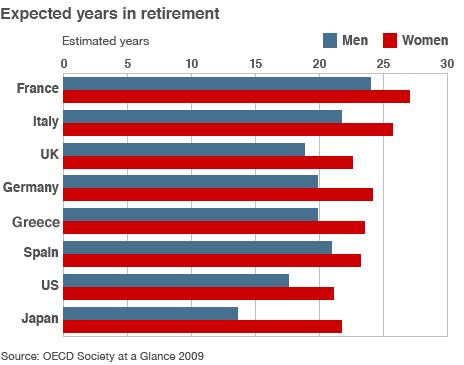France pension protest numbers in dispute
- Published
The BBC's Christian Fraser says initial signs are that the strikes not as big as expected
French unions have reported turnout of nearly three million people at rallies against pension reform but police figures are much lower.
The CFDT federation said 2.9 million had joined events across France, exceeding the turnout of 2.5 million on 7 September.
Police put turnout in Paris at less than a quarter of the unions' figure.
Marches and rallies were held as strikes closed down much of the country's public transport.
The pension reform bill, which raises the retirement age from 60 to 62, has already been passed by France's lower house of parliament.
It will be debated from 5 October by the upper house, the Senate, where it is expected to pass comfortably.
President Nicolas Sarkozy says the reforms are needed to tackle France's budget deficit, and to help support an ageing population.
'Unfair burden'
Police said 65,000 people had turned out in Paris while unions there put the figure at 300,000.
Police put the number of demonstrators nationwide at 410,000 by midday - lower than the estimate of 450,000 protesters it gave at the same time on 7 September.
Officials also said the number of government workers on strike was down. A statement from the president's office said this showed that "either the French feel that all this is behind them or they're more in favour of the reform, or both".
The unions said the number of demonstrations was higher than two weeks ago, showing there was "a bigger support base throughout the country".
The figure for the previous strike day was itself highly disputed, with the government putting it at 1.1 million and the unions at 2.5 million.
Disruption to transport services began on Wednesday night. By early Thursday, only half of all trains were running, and the Paris Metro was down to about three-quarters of normal service.
About half the flights at Orly airport outside Paris were expected be cancelled, as well as 40% at the capital's Charles de Gaulle airport and at other airports throughout the country, the country's civil aviation authority said.
Most international air and rail links were not affected, however.

In addition, one in four teachers was on strike and some schools were closed, the government said.
The BBC's Christian Fraser in Paris reports that there is a threat from some unions of open-ended action and, if this gains support, it will certainly apply pressure to an already embattled president.
Mr Sarkozy, under attack from the EU for deporting foreign Roma and from the media over a lingering financial scandal, says he will press on with the reforms regardless.

There were major delays to rail services
French workers can expect to spend more of their life in retirement than those in any other country, according to figures from the Organisation for Economic Co-operation and Development (OECD).
Under current rules, both men and women in France can retire at 60, providing they have paid social security contributions for 40.5 years - although they are not entitled to a full pension until they are 65.
The government says it will save 70bn euros (£58bn) by raising the retirement age to 62 by 2018, the qualification to 41.5 years, and the pension age to 67.
Unions and opposition politicians say the plan puts an unfair burden on workers, particularly women, part-timers and the former unemployed who may struggle to hit the 41.5 year requirement.
They have made counter proposals, including calls for taxes on certain bonuses and on the highest incomes to help fund the pension system.
- Published14 September 2010
- Published14 September 2010
- Published15 September 2010